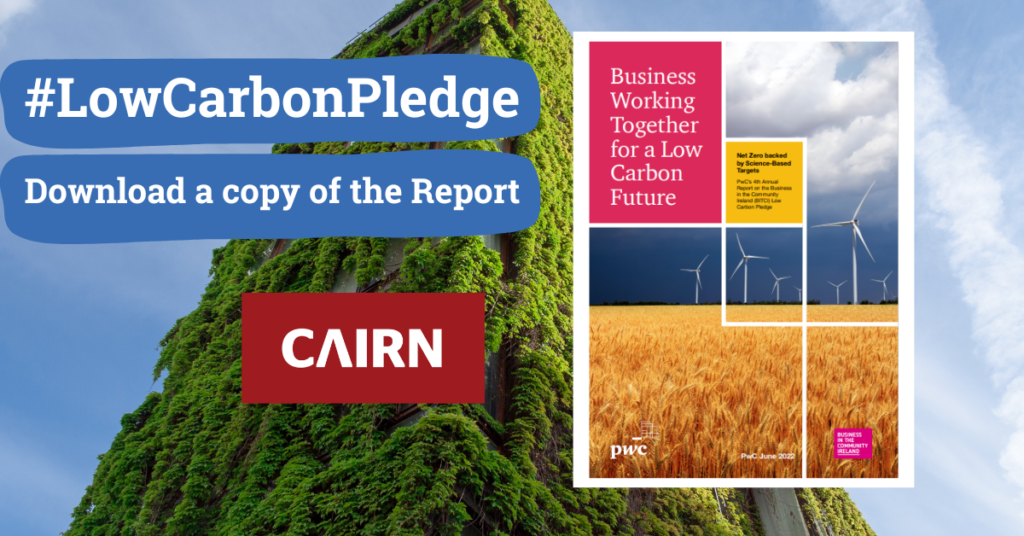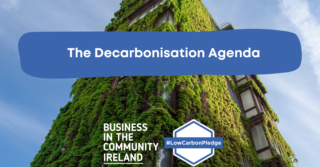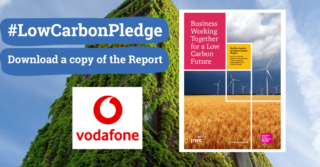Embedding sustainability through data-driven facts with Cairn Homes
Together, building and construction are responsible for 39% of all carbon emissions in the world and therefore represent a must-win decarbonisation segment both globally and locally. Cairn Homes want to take a prominent role in promoting sustainable and attainable building in Ireland, while in parallel being respectful of the change this will have on both suppliers and customers.
The journey to Science Based Targets
While Cairn Homes has had a longstanding interest in sustainability a significant turning point occurred 3 years ago, when in 2019, a commitment was made to investors to change from the then CSR focus to basing a sustainability strategy rooted across the full E, S and G spectrum. This allowed the company to identify the truly material ESG factors for their business and set the path towards science-based targets. BITCI played a central role in supporting and encouraging this change in focus. This shift was fundamentally strategic, and Cairn Homes found that it was critical to balance the low carbon construction ambition with a broader interpretation of sustainability which takes account, for example, of the very important societal role they play in the provision of much needed housing.
A strong data driven fact base underpins both the sustainability strategy and the associated action plan. Cairn Homes reports in line with definitions prescribed in internationally recognised frameworks: Sustainability Accounting Standards Board (SASB) Standards, Task Force on Climate Related Financial Disclosures (TCFD), and partially reports under the Global Reporting Initiative (GRI). This helps keep them accountable by ensuring their metrics and key performance indicators (KPIs) are comparable to those of their peers and allows external stakeholders, including investors, to understand the material actions being taken to deliver on their ESG strategy. In addition, they show the on-the-ground reality of the implementation of their strategy through case studies that illustrate the depth and breadth of a culture of sustainability at Cairn.
In January 2022, Cairn Homes, went one step further, and committed to setting Greenhouse Gas (GHG) emission reduction targets aligned with the Science-Based Targets Initiative with expected verification in 2023. They have measured their Scope 1 and 2 emissions and are in the process of measuring a Scope 3 baseline incorporating all relevant supply chain categories. They are also conducting Life Cycle Assessments (LCA) of their homes to understand the embodied carbon in their homes and how best to reduce it further. They have measured their Scope 1 and 2 in line with international best practice – the GHG Protocol Corporate Accounting and Reporting Standard and the aligned ISO 14064-3 standard.
Their research to date has shown that their Scope 3 comprises the vast majority of their total emissions and within Scope 3, the majority of those emissions arise from the materials they choose and through the energy consumption of the homes they build over the lifetime of the home. As a result, their sustainability actions focus on their most material impacts: the energy efficiency of their homes in use and the construction materials used. They are also broadening their circular economy activities, starting with their soil management strategy and looking to net gain biodiversity targets for their sites going forward.
Their actions to date range from innovations in the fabric, structure, materials, construction methods and technologies they use. This has led, for example, to prioritising timber frame construction and incorporation of air-source heat pumps in new homes which eliminate the need for fossil fuel-based heating systems. They are constantly seeking new innovations to maximise the energy efficiency in home use, with the result that 100% of their homes are BER (Building Energy Rating) A rated as a minimum standard. They are also driving further carbon savings through innovations such as the use of light gauge steel which can reduce the quantity of carbon intensive concrete required by up to 50%.
Advice for other businesses
Cairn Homes has some specific recommendations for others embarking on this journey. Pilot new technologies – don’t rely on traditional methods to achieve your decarbonisation targets. Business strategy and sustainability strategy need to be aligned. Fully integrate material sustainability issues into your corporate strategy. Imbed sustainability across the organisation – make it everyone’s job. Get on the journey as fast as possible but be patient in terms of collecting the required information, it needs to be verified and accurate. Treat non-financial data the same way you treat your financial data and often talking to your Finance team can help as they have the required mindset to accurately gather and report on data.
In relation to the building sector, Cairn Homes recognise the need to reduce usage of non-renewable materials and builders and developers should incorporate circular economy principles into the development of their products. Supply chain visibility is a high priority for Cairn Homes under both Environmental and Social categories, and they recommend that all industry stakeholders commit to continuous structured engagement with their suppliers and subcontractors, to help to deepen their ESG knowledge, increase collaboration and share more sustainable ways of working.
Download the Low Carbon Pledge report here.







